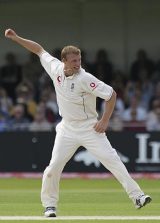
|

'Flintoff's bowling is central to the way England play; his batting, on its day, is a mighty bonus'
© Getty Images
|
|
In the week since the Lord's Test petered out into a draw, England have come under heavy fire for their declaration, which left only 80 overs to take 10 wickets with a depleted attack. Duncan Fletcher bristled at the bad reviews, but part of him must know that the only way there was going to be a result was if half the Pakistan team ran themselves out. Anyway, dwelling on the declaration rather misses the point. The rot set in with England's selection. Their line-up could have been hand-picked for a high-scoring draw.
The selectors were in a tight spot, forced to find an answer to their least favourite conundrum: how to replace Andrew Flintoff, exemplary third seamer, big-hitting batsman, crowd-pleasing mood-setter and stand-in captain. Nobody is irreplaceable, they say, but that ancient piece of wisdom can now be shot down in one word: Flintoff.
So, how to replace him? The chairman of selectors, David Graveney, was so exercised by this dilemma, he came out with a public statement that wasn't bland. "You can't replace the irreplaceable," he said, "so you either weaken the batting or the bowling." They opted to weaken the bowling, handing Flintoff's place to Ian Bell, the spare top-order batsman. Bell can bowl quite respectably, but Andrew Strauss didn't ask him to, despite having eight and a half hours to kill in Pakistan's first innings.
The choice of Bell has been acclaimed as the right one because he made a hundred, helping pull England round from a shaky start to a rock-solid 528. I'm not so sure. By picking a batsman, the selectors were further weakening a suit that had already been weakened by the loss of Simon Jones and Ashley Giles. And they were ignoring Pakistan's own injury list, which included both new-ball bowlers, Shoaib Akhtar and Rana Naved, plus the next best thing, Mohammad Asif.
The selectors were saying in effect that they view Flintoff primarily as a batsman. It's true that he has always seen himself as a batter who bowls. But that is just perception taking time to catch up with reality - or, perhaps it's self-protective, preparing for the day when his left foot can stand no more of being slammed into the bowling crease.
Last summer I asked Flintoff what would happen if he could bowl at himself. "Probably get meself out," he said. The LG Ratings have it about right, placing him sixth in the world for bowling and 25th for batting. His bowling is central to the way England play; his batting, on its day, is a mighty bonus. He scores a hundred in every 12th Test, but he takes a four-for every seventh.

|

'Jamie Dalrymple might score 20 fewer runs per match than Bell, but would be good for a couple of wickets'
© Getty Images
|
|
Flintoff represents a quarter of England's wickets but only about one-ninth of their runs. You could argue that his runs punch above their weight, because, like Adam Gilchrist's, they come late and fast and grab the initiative. But his wickets are pretty punchy too, as shown by the way he hunts down men like Gilchrist.
A rule of thumb for replacing Flintoff could go like this: if another bowler is missing, pick a bowler; if another batsman is missing, pick a batsman. Currently two other bowlers are missing (Jones and Giles), and one batsman - poor old Michael Vaughan.
Of these losses, only one is acute: Jones, for his reverse swing and his sizzling strike rate. Vaughan is a big loss too, but for his captaincy. His runs, as Lord's confirmed, can be supplied by Alastair Cook or Paul Collingwood, albeit with less flair. (That's another reason Lord's was a draw: all four of England's hundreds came from their more sedate batsmen.)
A team that was serious about winning at Lord's would have picked another bowler-who-bats in place of Flintoff. Admittedly, there were few candidates: the only one coming to mind is Mark Ealham, who, at 36, would have been the Shaun Udal solution.
The selectors have now half-acknowledged their mistake and sent for a batsman-who-bowls, Jamie Dalrymple. He might score 20 fewer runs per match than Bell, but would be good for a couple of wickets, and would free Monty Panesar to be less of a stock bowler and more of a cutting edge. As a second spinner, Dalrymple would also enable Matthew Hoggard and Steve Harmison, the last men standing from the Ashes attack, to bowl in short bursts.
If Dalrymple bats at number six on Thursday, we will know England mean business. If he carries the drinks, and Strauss again has only four bowlers with which to defeat that massive middle order, it will be time to have a little flutter on Pakistan.
Tim de Lisle is a former editor of Wisden and now edits www.timdelisle.com

